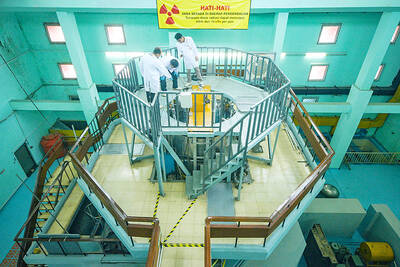The man who recorded a video clip allegedly showing a well-connected Malaysian lawyer brokering the appointment of top judges is reluctant to reveal his identity because he fears for his safety, opposition politician Anwar Ibrahim said.
Anwar said in a statement late on Friday that officials from the government's Anti-Corruption Agency (ACA) met him to try to determine the clip's authenticity, but Anwar declined to tell them who recorded it.
"I have informed the ACA that the person is prepared to issue a public statement, although he is fearful of his personal security," Anwar said. "We remain confident the truth will come out soon, and we will in no way compromise our sources."
Anwar has previously said he obtained the video from someone who secretly shot it at the lawyer's house in 2002. It shows the lawyer talking on his mobile phone and identifying the person on the other end as a senior judge.
The lawyer allegedly talks about how he helped get the judge appointed to his current post and discusses plans to elevate him further with the help of a tycoon and a senior politician.
A number of prominent judges are also named during the conversation.
Anwar, an adviser to the opposition People's Justice Party, said the government should establish a Royal Commission to uncover the truth.
The Bar Council, which represents 12,000 lawyers, has demanded action to restore confidence in the judiciary.
Judges are appointed by the king with the prime minister's recommendation.
The council has said an impartial commission should oversee the appointments.
The government recently appointed an independent panel to investigate the authenticity of the video.
However, activists say the panel lacks sufficient power and should expand its probe to look into the conduct of judges.

Four people jailed in the landmark Hong Kong national security trial of "47 democrats" accused of conspiracy to commit subversion were freed today after more than four years behind bars, the second group to be released in a month. Among those freed was long-time political and LGBTQ activist Jimmy Sham (岑子杰), who also led one of Hong Kong’s largest pro-democracy groups, the Civil Human Rights Front, which disbanded in 2021. "Let me spend some time with my family," Sham said after arriving at his home in the Kowloon district of Jordan. "I don’t know how to plan ahead because, to me, it feels

Poland is set to hold a presidential runoff election today between two candidates offering starkly different visions for the country’s future. The winner would succeed Polish President Andrzej Duda, a conservative who is finishing his second and final term. The outcome would determine whether Poland embraces a nationalist populist trajectory or pivots more fully toward liberal, pro-European policies. An exit poll by Ipsos would be released when polls close today at 9pm local time, with a margin of error of plus or minus 2 percentage points. Final results are expected tomorrow. Whoever wins can be expected to either help or hinder the

North Korea has detained another official over last week’s failed launch of a warship, which damaged the naval destroyer, state media reported yesterday. Pyongyang announced “a serious accident” at Wednesday last week’s launch ceremony, which crushed sections of the bottom of the new destroyer. North Korean leader Kim Jong-un called the mishap a “criminal act caused by absolute carelessness.” Ri Hyong-son, vice department director of the Munitions Industry Department of the Party Central Committee, was summoned and detained on Sunday, the Korean Central News Agency (KCNA) reported. He was “greatly responsible for the occurrence of the serious accident,” it said. Ri is the fourth person

SKEPTICAL: Given the challenges, which include waste disposal and potential domestic opposition, experts warn that the 2032 nuclear timeline is overambitious Indonesia is hoping going nuclear can help it meet soaring energy demand while taming emissions, but faces serious challenges to its goal of a first small modular reactor by 2032. Its first experiment with nuclear energy dates to February 1965, when then-Indonesian president Sukarno inaugurated a test reactor. Sixty years later, Southeast Asia’s largest economy has three research reactors, but no nuclear power plants for electricity. Abundant reserves of polluting coal have so far met the enormous archipelago’s energy needs, but “nuclear will be necessary to constrain the rise of and eventually reduce emissions,” said Philip Andrews-Speed, a senior research fellow at the